Businesses
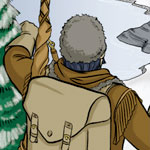
Coureurs des Bois
A vast majority of the furs transported through Sherbourg are trapped and traded to the colonists of Aradie by the native tribes of Everique. The colonial government prefers letting the natives do the trapping, as it helps keep the peace with the various tribes. The natives know the land very well, and they are eager to trade the furs for Japethan goods. The tribes, especially the Elakanois and the Liranequois, take their role as primary supplier to the Saronnans of Aradie and the Kleef at their colony of Meerpelt very seriously. The Liranequois back up their claims with their tomahawks.
Not all Aradiens are willing to let the natives monopolize the fur trade. Hundreds of adventurers who call themselves the coureur des bois (literally Runners of the Wood) find the call of the wild too strong. These independent entrepreneurs risk the journey west to the Lakelands where they trap beaver and other animals for themselves. The wealth that the coureurs can acquire is staggering, and most of them earn and lose fortunes several times over the course of their lives.
To succeed at this demanding life, the coureur des bois must be skilled woodsmen, expert canoeists, and cagey businessmen. They are oftentimes the most knowledgeable scouts and guides available. The only Japethan eyes to see many of the natural wonders of Everique have been those of the coureurs des bois. They often adopt the ways and dress of the natives and carry trade goods to buy the goodwill of the local tribes. Some coureurs even settle among the tribes and take native wives, leaving the trappings of Japethan society behind.
The Governor General of Aradie disapproves of the coureurs and discourages their activities at every turn. Their independent trapping undermines the value of the fur trade monopoly granted to the Aradie Trading Company, circumvents the treaties signed by Saronne with the tribes, and destabilizes the price of furs. Independent fur trapping is illegal and carries a hefty fine and time in the pillory. However, the number of gendarmes and soldiers the Governor General has is very limited and the expanse of Everique is vast. Ultimately, there is very little the Crown’s representatives can do to stop the coureurs des bois from slipping away into the wilderness in their frail canoes.
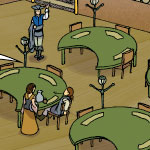
Gambling Hells
Gambling hells have proliferated in the past half century across Japethe as gambling has become more popular. Hells are the gambling establishments open to the common man. They arose in stark contrast to the social clubs frequented by the nobility and rich gentry. Clubs are reputable places for high society to gather for a variety of social functions, which includes gambling, whereas the hell's sole purpose is gaming. Additionally, the lack of membership requirements for entry means that all classes can mingle in the hells.
The term "hell" arises from the structure of the buildings chosen by gambling dens. Their gaming rooms are kept in the deep interior of the building to keep out the gendarmie, undesirables, and distractions (like wives and husbands). Without natural light, these rooms are perpetually cast in smoky darkness, lulling the gambler into a state of disassociation with the outside world. The gambling dens place their tables in a sunken area of the gaming room so that the staff (called hellions) can keep an eye out for cheats and scoundrels. The passage into a gambling sanctum is a sensation that many poets have likened to sinking into the abyss of hell. This, combined with the hells' shady reputation as places for the poor or damned ensured that the term stuck.
Also see Gambling under Entertainment.
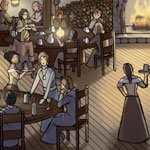
Saloons
A relatively recent phenomenon, saloons have surged in popularity to become the most popular entertainment establishments in Aradie. In Sherbourg, most of the saloons are gathered together on one street in the Riverside District that has become known as Iniquity Row. The distinguishing feature of saloons is stage shows that feature singing, dancing, and comedic skits. Saloon entertainers are almost all women and are commonly known as "ladybirds." The popularity of the saloons make some of the leading entertainers into minor celebrities. The larger saloons often bring talent from Saronne to provide featured entertainment for either the winter or the summer. Between acts, the performers mingle with the crowd and encourage the audience to purchase drinks and food from the establishment. Some ladybirds are also doxies, but this is by no means universal and is less likely to be true the more talented and popular the performer is. When shows are not performing, saloons offer a variety of other entertainment, such as card games or darts.
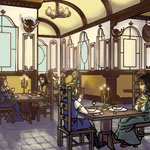
Social Clubs
Social clubs are a recent addition to the urban landscape. They are an upscale relative of the chocolate house and populated by the wealthy bourgeois. Entrance to a social club is restricted to membership, and membership is limited to those of good family and of gentle stature. Non-members can gain access to the club through paying exorbitant visitor fees.
Social clubs provide an environment for eating, drinking, and gambling away from the low-class saloons and gambling hells. However, the services of social clubs varies widely depending on the focus of the club and the tastes of its membership. Some clubs have a particular focus in their memberships such as explorers, veterans, hunters, fur trappers, or academics. The unifying factor in all clubs is their luxury. The meals served in the clubs are some of the best outside of a noble's court, the wine selection is extravagant, and tremendous sums are won and lost at their gambling tables.
The first social clubs appeared in the port cities of Kleef roughly fifty years ago as that country's wealth soared from overseas trade. Social clubs then spread to the Freeports of the Kennard Reach before making their way through Morante and down to Saronne. They are now ubiquitous in the richer districts of Japethan cities. Today, even colonial cites form social clubs to mimic the popularity of such things in the mother country.
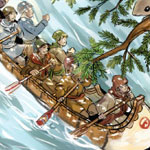
Voyageurs
As the fur trade moved farther west, south, and north from Sherbourg, the fur trading companies of Aradie needed to transport trade goods to their far-flung trading posts throughout the Lakelands of Everique and bring the furs back to Sherbourg. Because of the many rapids and shallow drafts of the lakes, the only practical way to do this is by canoe. And it is the voyageurs who paddle those canoes, making the wealth of Aradie possible.
The trading companies hire a crew of eight to ten voyaguers to paddle enormous canoes (about 36 ft in length) up the Grande Vire and across the lakes. The men are expected to work 14 hours a day, paddle at 55 stokes a minute, and carry two 90-pound bundles of furs over the many portages necessary for the trip. To pass the time and to help them keep in rhythm while they paddle, the voyageurs have co-opted many of the sea shanties from the sailors they met in the docks in Sherbourg, giving them their own twist. The voyageur songs can be humorous, grim, or downright bawdy, but all are incredibly catchy and help devour the miles the voyageurs must cross.
The voyageurs are strong, hearty men with a taste for the outdoors and the freedom granted by the wilderness, but the life is dangerous. The rapids of northern Everique can easily kill, and severe storms blow across the lakes with little warning. Yet the call of the voyageur's life and the wealth promised for successfully running a route continue to bring many men to the Lakelands. Hundreds of these men now ply the waterways of northern Everique, their songs mixing with the roar of the rapids.
« Return to the Almanac Index

